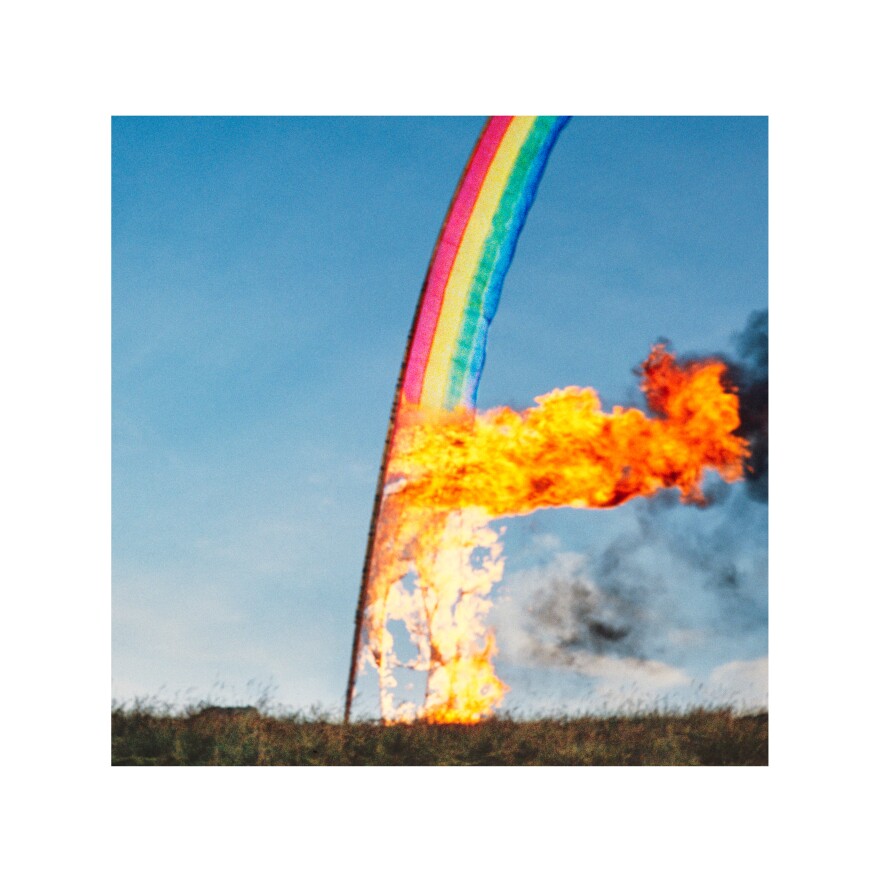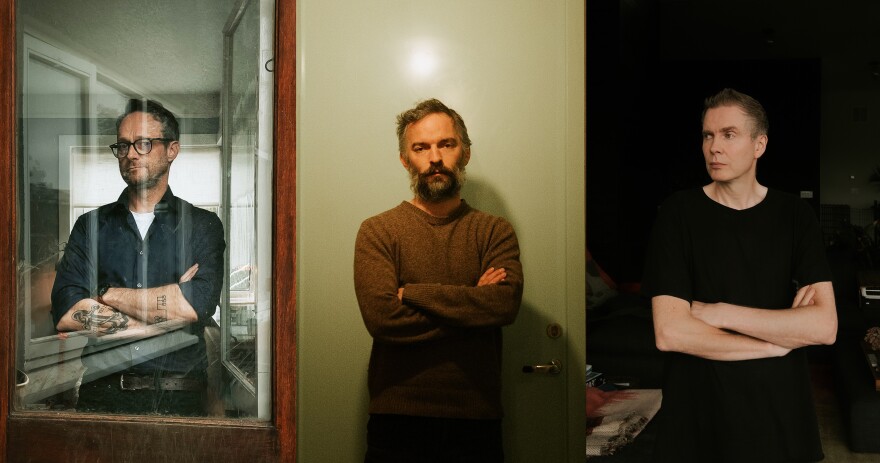The first new album from the Icelandic band Sigur Rós in a decade begins with something that will be immediately identifiable to fans of the band — the voice of Jónsi — but that familiar sound is quickly joined by something new. The album, called ÁTTA, surrounds his voice with the sound of strings.

ÁTTA translates from Icelandic as eight. It is the band's eighth studio album; their first came out 26 years ago. When I spoke with Jónsi last week, I learned that the band made its way back together slowly, over a few years. In order to create this magnificent album the three bandmates — Jón Þór Birgisson (Jónsi) on vocals and cello bowed guitar along with multi-instrumentalist Kjartan Sveinsson (Kjarri) and bassist Georg Hólm (Goggi) — first reunited in Jónsi's basement, before finally making their way to Abbey Road Studios where they teamed up with the London Contemporary Orchestra and conductor Robert Ames.
It's amazing to think of these three musicians, playing this music since they were in their teens or early 20s, finding their way back together. Sigur Rós released its previous studio album, Kveikur, in 2013, and then its members split to work on separate projects. (Sveinsson departed the group earlier, in 2012.)
A new Sigur Rós album is always a thrill to me. They make the kind of music that I yearn for, that not that many artists make. These are sonic adventures, not a stream of love songs or songs about someone's feelings or observations. This music creates a world I can all dive into and interpret in ways that feel personal and not dictated. It's what I think music does better than any other medium and these three dear friends from Iceland have found a way to be both expressive and welcoming.
So what brought this group back together after all these years? That's where my conversation with Jónsi begins.
This interview has been edited for length and clarity.
Bob Boilen: So what inspired you all to get back together and start making music [together] again?
Jónsi: I think it was kind of like an accident. Kjartan, [the] keyboard player, that hadn't been in the band for 10 years, came to visit me in LA and we did like, did a kind of recording jam session in my basement. We had my guitar with a cello bow and effects, and he rented a Yamaha CP70, like an electric piano [with] strings and harps, and we basically started to play.
How did that feel?
It was great. It's kind of amazing to play with old friends because it feels so natural somehow. You just play and feel like nothing has changed over the years and things come out and you start writing songs and melodies and I guess that was the beginning of the new album.
[Did] the three of you [including bassist Georg "Goggi" Hólm] get together right away?
It was a little bit later. Kjartan came here and we wrote a few ideas, and then he went back and then COVID hit. Two years later he came back again. We did some ideas. And then Goggi came. He got involved and it became more of an album.
[The first song we heard from ÁTTA was just released this week.] I think it translates as "blood rock?"
In Icelandic, it's Blóðberg. It means "creeping thyme." It's these little herbs, they grow in the highlands in Iceland and they're pretty pink and very fragrant. So it's nice to see that opposite of the bleak, colorless Icelandic nature with this extremely pink, vibrant herbs.
You're singing in Icelandic in this song — can you tell me a little about what you're singing?
It kind of feels like it's somebody drawing his last breath or he's dying or he's taking a bow. But to me, it's also like coming back to Iceland on, like, the perfect, beautiful summer day where the sun is shining and you lay in the moss and just breathe in.
I'm thinking about three old friends who've been playing music together since they were, well, probably teenagers, right? What is it that you bring out of each other when you get together that's different than something you might do on your own?
I mean, we have been in a band now for 28 years? This is a little bit crazy. But yeah, I think we have this nice ability to not communicate to each other, and not talk. We don't make plans or talk too much about it. I think that's always kind of the nicest thing, when things come from somewhere above and you just grab it and it becomes a song.
So then this sound on this record is obviously more than a few people getting together. There's a 32-piece orchestra.
We went to Abbey Road in London to record with the London Contemporary Orchestra with Rob Ames, who is a conductor there. Kjarri did the string arrangement and stuff like that. Yeah, he's amazing at that. It's always fun to go to Abbey Road to record. This is an iconic place. I went to Studio Two where the Beatles did all their stuff. So it's fun for guys from Iceland to go there. It's like, "Whoa, cool."
So when you go and do this in Abbey Road, are you there playing with the orchestra or are you bringing recordings that you did in your basement?
Yeah, for this album, we pre-recorded our parts and then bring them to the studio and then they play over that, basically. But actually, maybe 10 or 15 years ago, we did one session in Studio One where we had like a full orchestra, like 90-something people and did a live recording there. It's stressful. You can't f*** it up. But yeah, this one, we just we had so many songs we needed to get done.
I'm a photographer, and during COVID especially, I got into taking pictures of macro photography, which is really hyper close-up photography of flowers and insects. And then recently I've gotten into taking pictures of birds. And so [last night] I was listening to the record and the screensaver popped on my television of my photographs. And I'm listening to this and thinking, this is so beautiful and it goes so well together.
And then today, — I live in the Washington area [and] there are these fires burning up north in Canada that are creating this incredible doomy haze outside. And I'm looking out my window, listening to the record, and all of a sudden the record felt kind of apocalyptic. I love the way this music takes different form in different listening situations. What are you hoping the listener gets from it?
I mean, I just think it's so weird and funny that three guys coming from Iceland singing in Icelandic and nonsense that people actually listen to it and they come to our shows and listen to it at their house like you're doing. And I think what is most remarkable is that people take their own meaning from it because they don't understand the lyrics. Or everybody makes their own meaning and interpretation in their mind. And I think that's kind of amazing. You're not like being spoon fed some specific lyrics, some love lyrics or something.
I think that's what I've always loved about your music. I never knew what you were saying, and with intent — sometimes you weren't saying anything in particular. When you listen to music for your own pleasure, what do you want from music?
Uh, nothing. That's what I'm actually looking for.
What do you mean, nothing?
As weird as that sounds, when you are working in music every day, you're recording this and that. I have a hard time having music in the background because then I start to listen to it. I start humming the melodies and it's kind of a distraction for me. I love listening to old jazz, Billie Holiday and stuff. There's something with old recordings that's like a fireplace or something in the background — it's kind of more like a mood than music. I guess I started, in COVID, just having an environmental sound like forest sounds and birds, waves and stuff. It's just something nice about it.
Of course, I listen to music, you know, a little bit. I listen to the news in the morning, and sometimes I listen to, [sighs] I don't know, radio. Yeah, not much music. My boyfriend listens to music, different pop stuff, and I guess I have to listen to that. And some of it is good.
I understand that feeling.
I've actually been doing this forced listening on Spotify where actually I'm forcing myself to listen to new music to see, "OK, what's out there, is anything exciting?" So that's also been healthy, I think.
And is there anything in particular that strikes you? Would it be something that is rhythmic or something that is more ambient? What do you find attractive?
Nothing. There's nothing out there. No, it is both, I guess. I love Julianna Barwick and Mary Lattimore. They're two of my favorites, just because they have tapped into something magical.
And I think that's what you do as well. It's a rare gift to be able to do that. The three of you have done this thing you hadn't done — for the three of you — in more than 10 years. Did it feel like a goodbye?
This album?
Yeah.
I mean, funny question. But I like it.
I say that because it had a final feel to it, when it wrapped.
It is interesting because when we were doing this album, there was this, I don't know, maybe it's just in the world we're living now, but it's this doom and gloom everywhere you scroll on social media and and everything kind of has this apocalyptic feel to it. The world is ending, nature is dying, climate disasters one after the other. Yeah, wildfires in Canada and a lot of wildfires in LA War in Ukraine and all this stuff. And we were kind of doing it at that time the war started and all these disasters. And I remember, yeah, there's definitely something ... not gloomy, but, I don't know, something heavy but also hopeful [at the] same time.
There is a bit of both, and some of it is the mindset of the listener.
Also, I think when you've been in a band for so long, you're always asking yourself, "Is this the last album? Was this last goodbye? Is this the last tour?" And so that it's always there also, I guess.
Copyright 2023 NPR. To see more, visit https://www.npr.org.



